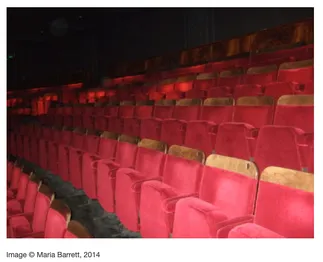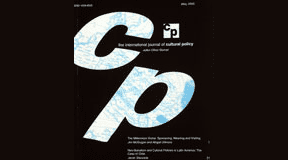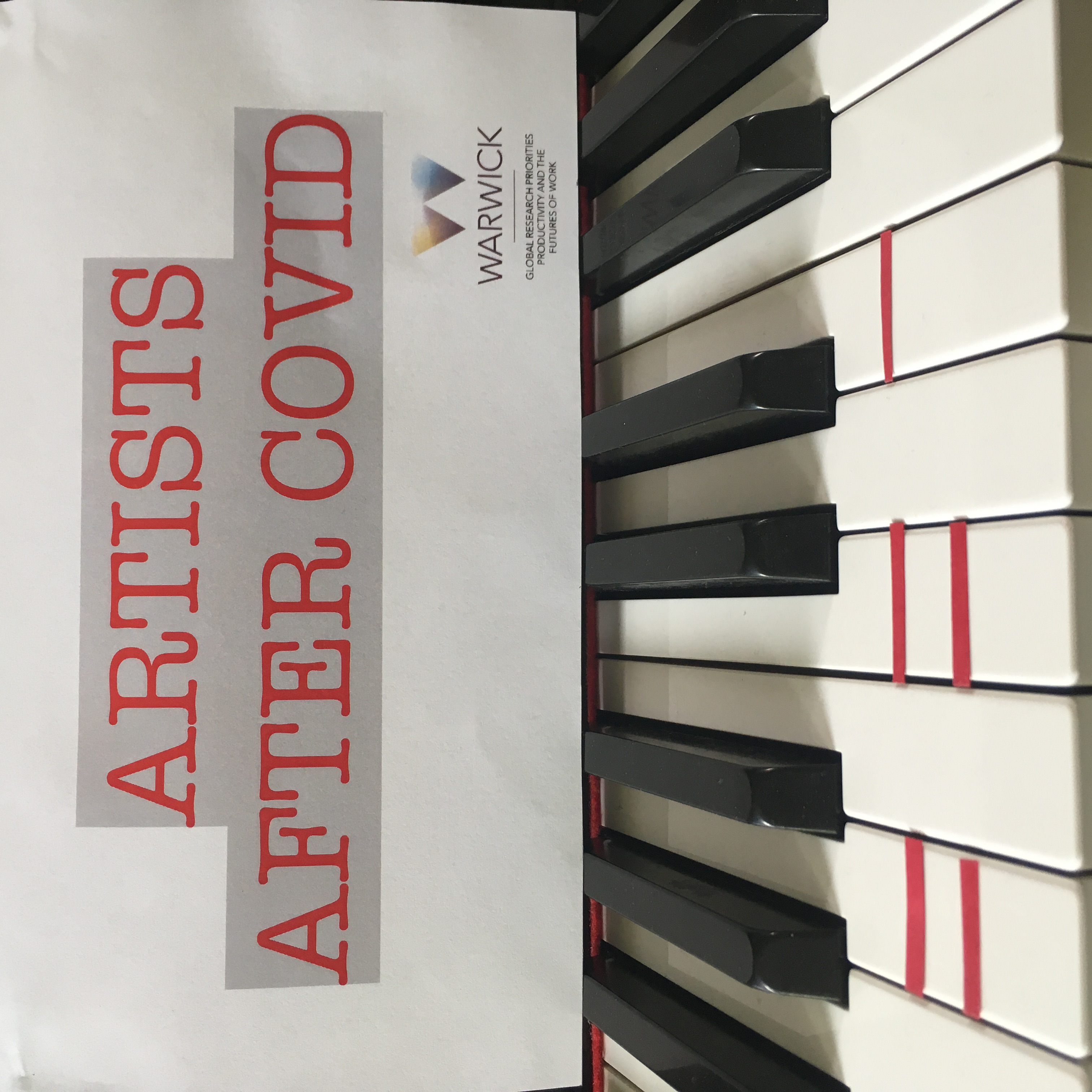Impact and Engagement
Research in the Centre for Cultural and Media Policy Studies focuses on how government or corporate policies can impact, either directly or indirectly, on the national, regional or a community's cultural life. Culture is explored in its widest form, from reimagining culture, media or art as a 'public service' to the recognition that public services such as health, energy, water, transport and environmental services all have cultures, cultural experiences and cultural impacts. Our research improves national and international discourse about the arts, media, culture and cultural value by providing rigorous and unbiased evidence and arguments. A key component of our work is engaging with our research users – policy-makers, public bodies, cultural institutions, media producers, artists and members of the public – through collaborative projects, lived experience studies, public events and the creation of new artwork and media.
Our work supports and strengthens national arts and media organisations and cultural institutions through the many collaborations and consultancies with external partners. From consultancy with Netflix to advising the BBC's Research and Development and Creative Diversity departments. From being a UNESCO Chair in Arts and Development in Hildesheim to UNESCO Chair in Cultural Policy and Management in Belgrade. Our colleagues are active in conversations outside the university such as in City of Culture 2021's evaluation and artistic projects, in the European Cultural Foundation Amsterdam, at AMU Cultural Observatory Poznan, or with local businesses, start-ups and creative organisations in Coventry, Warwickshire and Birmingham. The Centre has always had a focus on the West Midlands area, advising regional creative businesses' and organisations' capacity to deliver first-class artistic productions through network development such as through Warwick Creative Exchange and now the Creative and Digital Communities Initiative.Link opens in a new window
Projects and Initiatives
The Museum of Climate Stories

The Museum of Climate Stories is project based at the University of Warwick which explores creative and imaginative ways of responding to the unfolding planetary emergency, by encouraging climate action at a local level.
Cultural Evaluation and Culture After Covid

We are very fortunate to have a key member of our team who is also the Director of Earthen LampLink opens in a new window which has since 2011 worked across the creative sector providing market research and feasibility studies, evaluation, impact assessments and strategy development support with a deep knowledge and understanding of the arts and culture, the policy context and the creative industries. Dr Vishalakshi Roy has developed a City of Culture 2021 Case Study on change with Dr Jonathan Vickery, Dr David Wright and Dr Heidi Ashton. Dr Roy has led a Focus Study for the Monitoring and Evaluation of Coventry City of Culture 2021 (2021-2022) funded by Coventry City of Culture Trust, and investigated the impact of the pilot project Creative Leadership Programme in Coventry. All of which strengthens the Centre's approach to cultural evaluation in the region and beyond. Interrogation of cultural strategies and integrating monitoring and evaluation frameworks for future urban cultural policy development is at the heart of this research which has direct beneficiaries in local government as well as the academic community seeking to better understand the exceptional impact of COVID19 on culture and audiences in the post pandemic cultural sector. Our focus on gender, ethnicity and disability is a principle feature of this impact-focused research. In addition, Dr Maria Barrett is a Co-Investigator on a national research project entitled COVID-19: Impacts on cultural industries and the implications for policy. This EHRC/UKRI-funded project is a collaboration with University of Leeds Centre for Cultural Value, the Policy and Evidence Centre (PEC), the Audience Agency, and a national consortium of researchers and partners. The project aims to deepen understanding of the impacts Covid-19 is having on cultural organisations, the cultural sector workforce, and audiences. It will also identify the implications for how and what policy decisions are made in response to the crisis. Dr Barrett's particular interest is in diversity and a potentially 'lost generation' of cultural workers. For more of our public engagement on Culture after Covid see our podcasts and videos below.
Widening the Pool of the DCMS Expert Advisors

The Parliamentary Office of Science and Technology (POST) Academic Fellowship SchemeLink opens in a new window (2021) is an important part of strengthening academic involvement in UK policymaking. Dr Maria Barrett's Link opens in a new windowFellowship with the DCMS Select Committee focuses on how the Committee can select more diverse witnesses to ensure the diversity of the theatre sector is rebuilt post-COVID. The Fellowship draws on Dr Barrett's extensive networks in the cultural sector and builds on her knowledge and experience of theatre and social class. The role has meant Dr Barrett attends the DCMS office in short intensive periods to gather information and observe working practices, and it will feed into her future impactful research and public engagement, as well as publications.
Creative and Digital Communities Initiative.Link opens in a new window

The Centre recognises the importance of the creative industries, economically, socially and digitally in all its research. Our university sits at the centre of a vibrant creative industries cluster, and the Centre's researchers, students and alumni make a significant contribution to the growth and innovation of this sector. Our colleagues have been supporting these diverse industries in the Creative and Digital Communities Initiative (or Creative Futures) as they engage with the university strategy, the new Faculty of Arts building, and the redevelopment of Warwick Arts Centre. There are regional opportunities around the Leamington Spa Creative Quarter, Coventry City of Culture, Birmingham Commonwealth Games, and the Centre has invested in research expertise, through our launch of a new innovative degree in Media and Creative Industries 2020, in order to position the Centre's significant civic role.
International Journal of Cultural Policy

The International Journal of Cultural Policy, founded and edited by Professor Oliver Bennett, has played a key role in establishing the field of cultural policy studies. It has become the primary outlet for new research on cultural policy around the world. As such, ministries of culture, arts councils and cultural organisations feature prominently in its subscriber list. Over 50,000 article full-text downloads were recorded in 2012. The journal's published research not only supports the research community but feeds directly into the world of policy and practice.
From Warwick Creative Exchange (2011) to City of Culture (2021)Link opens in a new window

Warwick Creative Exchange was established in 2011 to bring together expertise at Warwick with arts and cultural organisations in the West Midlands. It provided the building blocks for creating a network that identified and encouraged knowledge exchange building a basis upon which to design and deliver City of Culture 2021. Dr Chris BiltonLink opens in a new window and the Centre's associate member Prof Jonothan NeelandsLink opens in a new window co-ordinated Warwick Creative Exchange and Prof Neelands has played a leading role in CoC2021. Dr Vishalakshi Roy has led on evaluation research with Dr Heidi Ashton, Link opens in a new windowDr David Wright and Dr Jonathan Vickery.
Warwick Commission on the Future of Cultural Value (2013-2015)

A defining moment of the London 2012 Olympics was the Opening Ceremony, which aimed to convey the essence of British culture to global audiences. Culture is at the heart of national identity but it's currently under threat from cuts to public funding. Through evidence-gathering events with prominent individuals in the arts and policy-makers, the Commission aims to contribute a fresh perspective on how we can develop new policy thinking and practical recommendations that ensure the long-term sustainability of the national cultural eco-system in challenging and competitive times.
Pathways to Impact
Our Partners and Publics
Albany Theatre, Altro Flooring, Arts Council England, Association of Independent Museums, BAFTA Albert, BBC, Big Brum Theatre, British Council, CHEP, Common Story, Coventry Artspace, Earth Angel, Environment Agency, Flanders Film Fund, Greater London Authority, Green Film Shooting, Herbert Museum and Gallery, International Network for Contemporary Performing Arts, Jo Gane Artist, Mead Gallery, Museums Association, National Theatre, Neptune Environmental Solutions, Netflix, Nordic Ecomedia Alliance, Pangaea Poetry, People's History Museum, PLATFORM, Power to Change, Royal Society of Sculptors, Royal Shakespeare Company, Sante Theatre, Secoya, Stan's Cafe, Talking Birds, Trans Europe Halles, UNESCO, Unfold, United Nations Association
Our Podcasts
Our 'Faculty of Arts at Home' Films
Dr Chris Bilton
Dr David Wright
Dr Maria Barrett
Dr Heidi Ashton




